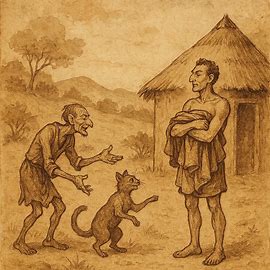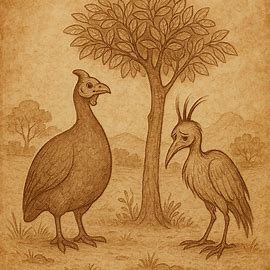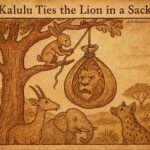There was once a man among the Merina who had heard whispers of two names that carried both awe and dread: Kotofetsy and Mahaka. These tricksters were renowned throughout the highlands of Madagascar for their unmatched cunning, weaving schemes so elaborate that no one who faced them came away unscathed. The man, however, grew restless. Pride swelled within him, and he began to boast loudly in the marketplace, declaring to neighbors and strangers alike: “I will find Kotofetsy and Mahaka, and I will prove to all of you that I am sharper than the sharpest, cleverer than the cleverest. Their tricks will crumble before me.”
His arrogance became a fire that would not let him rest. Day after day, he imagined himself victorious, praised by the people for finally humbling the infamous pair. And so, one morning, he set out across the rolling red hills and grassy plains of the highlands, determined to seek them out.
As the sun climbed higher and the heat pressed down upon the land, the man came upon two figures sitting in the shade of a small house. They were elderly men, gray-haired and bent, warming their bones in the sunlight. Their eyes gleamed with a kind of mischief hidden beneath wrinkles, though the traveler, blinded by ambition, did not notice.
“Good day, fathers,” he greeted, bowing politely. “Tell me, do you know where I may find the notorious Kotofetsy and Mahaka? I would be most grateful to meet them.”
The two old men exchanged a knowing glance before one answered, voice calm and smooth: “Why, yes, young man. You are in luck. Kotofetsy and Mahaka dwell in that very hut yonder. But heed this warning: they are thieves of the highest order. If you enter wearing your fine clothing, they will surely strip you of it. Best leave everything with us, and we will guard it safely until you return.”
READ THIS: Kotofetsy,Mahaka, and The King: A Madagascan Folktale That Teaches Lessons on Greed and Deception
The man’s chest swelled with self-assurance. “So this is the great test? Bah, I am too clever to fall prey.” Without a second thought, he disrobed. Piece by piece, he laid down his garments , his flowing lamba, the finely woven salaka about his waist, even the smallest cloth that covered his modesty. Naked as the day he was born, he piled his belongings into the laps of the two supposed elders and strode boldly into the hut.
Inside, he found a group of villagers gathered in conversation. Startled by his entrance, they burst into laughter.
“What business brings you here, naked man?” one jeered.
“I am searching for Kotofetsy and Mahaka,” he replied proudly.
At this, the room shook with laughter. “Did you not see them? They were the two old men at the doorway!”
The man’s face flushed crimson. He dashed back outside, only to find the space empty. The sunlit doorway was bare, his garments gone, and with them the tricksters who had duped him so effortlessly. He called out, ran to and fro, but Kotofetsy and Mahaka had vanished into the winding paths of the hills.
There was nothing left for him but shame. Clutching only his dignity, the man was forced to walk home naked. Along the road, children pointed and laughed, women whispered behind their hands, and men shouted mocking words. Each jeer struck him harder than a stone. By the time he reached his village, his arrogance had withered away.
At last, humbled and humiliated, he admitted to all: “Kotofetsy and Mahaka are truly masters of deception. None can match their cunning.”
Moral of the Story
This Merina folktale carries a timeless lesson: pride often blinds a person to the truth before their eyes. The man believed himself clever enough to outwit the legendary tricksters, yet his arrogance made him their easiest prey. Wisdom is not in boasting but in humility, caution, and the ability to recognize when others hold greater experience. In life, those who underestimate others often find themselves disgraced, while those who walk with humility remain protected from unnecessary shame.
Knowledge Check
Who were Kotofetsy and Mahaka in this tale?
They were cunning tricksters from Merina folklore who deceived the prideful man.
What mistake did the man make before entering the hut?
He stripped off all his clothing, trusting the tricksters to guard them.
Why did the villagers laugh when the man asked for Kotofetsy and Mahaka?
Because he had already spoken to them, not realizing they were the two old men at the door.
What lesson does this folktale teach about arrogance?
That arrogance blinds people and often leads to humiliation and failure.
How did the man return home after being tricked?
He returned naked, mocked and ridiculed by all who saw him.
What is the cultural origin of this story?
It is a Merina folktale from Madagascar.
Source: Merina folktale, Madagascar.






